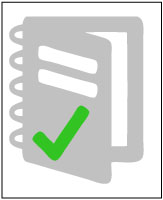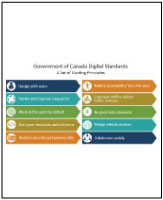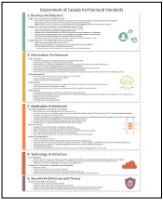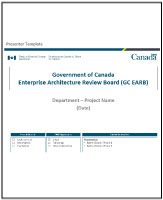Important: The GCConnex decommission will not affect GCCollab or GCWiki. Thank you and happy collaborating!
Difference between revisions of "GC Enterprise Architecture/Board"
| Line 1: | Line 1: | ||
{| class="wikitable" | {| class="wikitable" | ||
| − | ![[GC Enterprise Architecture]] | + | ![[GC Enterprise Architecture/Board/Enterprise Solutions|GC Enterprise Architecture]] |
![[GC Enterprise Architecture/Board|GC Enterprise Architecture Review Board, GC EARB]] | ![[GC Enterprise Architecture/Board|GC Enterprise Architecture Review Board, GC EARB]] | ||
|- | |- | ||
| Line 6: | Line 6: | ||
|[[GC Enterprise Architecture/Board/When to come|When to come]] | |[[GC Enterprise Architecture/Board/When to come|When to come]] | ||
|- | |- | ||
| − | |Enterprise Architecture Framework | + | |[[Enterprise Architecture Framework]] |
|[[GC Enterprise Architecture/Board/Forward Agenda|Forward Agenda]] | |[[GC Enterprise Architecture/Board/Forward Agenda|Forward Agenda]] | ||
|- | |- | ||
Revision as of 14:42, 21 December 2020
Note: These revised ToR are draft and awaiting final approval. Please send us any comments that you may have.
Terms of Reference
Background
On March 23, 2017, the CIO of Canada established the Government of Canada Enterprise Architecture Review Board (GC EARB). Since then, it has continued to support the achievement of the digital government vision:
“The Government of Canada is an open and service-oriented organization that delivers programs and services to citizens and businesses in simple, modern and effective ways that are optimized for digital and available anytime, anywhere and from any device.
Digitally, the GC must operate as one to benefit all Canadians.”
Effective Date
These updated terms of reference are planned for endorsement by GC EARB and approval by the Chief Information Officer of Canada in early 2021.
Mandate
The Policy on Service and Digital assigns responsibility to the Chief Information Officer of Canada to:
Section 4.1.2.3 Prescribing expectations with regard to enterprise architecture.
Section 4.1.2.4 to establish and chair an enterprise architecture review board that is mandated to define current and target architecture standards for the Government of Canada and review departmental proposals for alignment.
Responsibilities
GC EARB will:
Recommend endorsements of expectations with regard to enterprise architecture that will be prescribed by the CIO of Canada.
Define current and target architecture standards for the Government of Canada and review departmental proposals for alignment.
The Directive on Service and Digital articulates how Government of Canada organizations manage service delivery, information and data, information technology, and cyber security in the digital era.
Section 4.1.1the departmental Chief Information Officer (CIO) is responsible for:
4.1.1.2 Submitting to the Government of Canada enterprise architecture review board proposals concerned with the design, development, installation and implementation of digital initiatives:
4.1.1.2.1 Where the department is willing to invest a minimum of the following amounts to address the problem or take advantage of the opportunity:
4.1.1.2.1.1 $2.5 million dollars for departments that do not have an approved Organizational Project Management Capacity Class or that have an approved Organizational Project Management Capacity Class of 1 according to the Directive on the Management of Projects and Programmes;
4.1.1.2.1.2$5 million dollars for departments that have an approved Organizational Project Management Capacity Class of 2;
4.1.1.2.1.3$10 million dollars for departments that have an approved Organizational Project Management Capacity Class of 3;
4.1.1.2.1.4$15 million dollars for the Department of National Defence;
4.1.1.2.1.5$25 million dollars for departments that have an approved Organizational Project Management Capacity Class of 4;
4.1.1.2.2That involve emerging technologies;
4.1.1.2.3That require an exception under this directive or other directives under the policy;
4.1.1.2.4That are categorized at the protected B level or below using a deployment model other than public cloud for application hosting (including infrastructure), application deployment, or application development; or
4.1.1.2.5As directed by the CIO of Canada.
If the investment meets at least one of the criteria above, the department must bring forward the proposal to GC EARB.
Operation
GC EARB meets bi-weekly. As required and at the discretion of the Board’s Co-Chairs, special meetings may be called. Quorum must be met for when there are items requiring a decision. Quorum is defined as at least half of the members or their delegate being present. Should quorum not be met, items for decision will be deferred to the next meeting.
Secretariat support is provided by Committee Secretariat, Office of the Chief Information Officer, Treasury Board of Canada Secretariat.
Records of discussions and GC EARB presentations are posted on the GC Enterprise Architecture Review Board GCconnex page.
Working groups and other supporting governance may be created, as necessary and at the direction of the Co-Chairs.
Presentation Requirements
The purpose of the GC EARB engagement must be clear (information or endorsement).
- Departments are requested to use the GCEARB presentation template to ensure consistent provision of content to enable formal architectural assessment according to the requirements set out in the Service and Digital Target Enterprise Architecture and the GC Enterprise Architecture Framework.
- Departments are expected to submit their initial draft materials to the Office of the Chief Information Officer, Treasury Board of Canada Secretariat (TBS OCIO) no later than three weeks prior to the planned meeting date to initiate discussions with the TBS EA team to allow time for their review and analysis.
- Items that are considered low risk and/or where there are no concerns to raise can be considered as “consent agenda items.” The consent agenda items are not allocated any presentation time however, and if no concerns are raised at the meeting, the items are considered endorsed.
- Items that are informational or follow-up reports on conditions or actions from previous presentations, and where there are no concerns to raise, can be considered as “consent agenda items.” The review agenda items are not allocated any presentation time at the meeting.
Membership
The GC EARB is co-chaired by:
- Chief Technology Officer (CTO)* for the GC, Treasury Board of Canada Secretariat; and
- Chief Technology Officer, Shared Services Canada
Membership is at the Assistant Deputy Minister level and is determined by the Co-Chairs. The membership will be updated on an annual basis, or as required. All proposed changes to the membership must be submitted to the OCIO Committee Secretariat, who will seek the approval of the Co-Chairs.
Members may appoint one delegate who is at the Director General level or above that will serve as an alternate member and be empowered to participate in discussions on their behalf. No other substitutes or delegates will be accepted.
Members are required to commit to a one year term and are expected to attend the majority of meetings. In the event that a member is absent from 6 or more meetings throughout their term, their membership to the EARB may be revoked by the Co-Chairs. The identified alternate may replace a member only when the member advises OCIO Secretariat 24 hours prior to the scheduled meeting date.
* The Policy on Service and Digital states that “The Chief Information Officer (CIO) of Canada is responsible for … Establishing and chairing an enterprise architecture review board.” Following the practice established over the initial years of GC EARB, the CIO may delegate the co-chair role to the CTO.
#########################################################################################################
EA and GCEARB WIKI under construction, CONTENT below TO BE ARCHEIVED
#########################################################################################################
Handy Reference Materials[edit | edit source]
|
Link to the TBS policy that describes the mandate for GC EARB and outlines the related responsibilities for Departmental CIOs.
|
Government of Canada Digital Standards The Government of Canada's Digital Standards form the foundation of the government's shift to becoming more agile, open, and user-focused. They will guide teams in designing digital services in a way that best serves Canadians. |
|
Directive on Service and Digital Link to the criteria of when to come to EARB as well as the mandatory procedures to be incorporated.
|
GC Enterprise Architecture and Architecture Standards GC Enterprise Architecture and the Architecture Standard including the GC view of B-I-A-T-S+P. |
|
“Presenter” intake presentation to be completed by departments.
|
Mandatory Procedures on Application Programming Interfaces Link to TBS directive with detailed requirements for APIs. |






